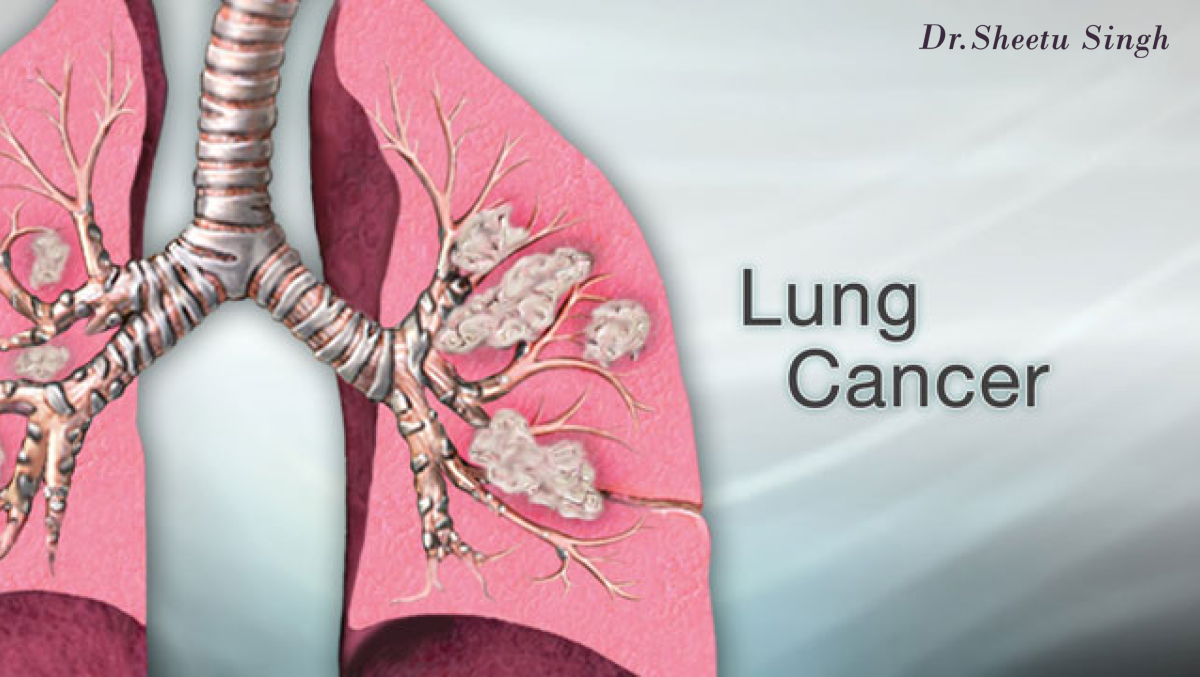Lung Cancer Symptoms You Must Never Ignore

Lung cancer is a serious and often deadly disease that begins in the lungs, the organs responsible for breathing. Millions of people worldwide are affected by this type of cancer, which is among the most prevalent. Lung cancer is mostly caused by smoking, though it can also strike non-smokers for other reasons, such as genetic susceptibility, exposure to secondhand smoke, or air pollution. Symptoms of lung cancer often include a persistent cough, shortness of breath, chest pain, and unexplained weight loss. Regular health checkups and knowledge of risk factors are vital because early detection is critical to increasing survival rates. Lung cancer in India has risen from 98, 278 cases in 2020 to 103, 371 in 2022. The disease is often linked to smoking, air pollution, and genetic mutations.
Dr. Sheetu Singh is a renowned pulmonologist specializing in lung cancer, offering comprehensive guidance on the diagnosis, treatment, and management of this complex disease. She highlights the value of early detection, patient education, and individualized treatment regimens. He has a thorough awareness of the most recent developments in medicine and approaches his work with compassion. Her lung cancer guide offers insightful information on the symptoms that should not be disregarded as well as risk factors including smoking and exposure to the environment.
Dr. Sheetu Singh advocates for a multidisciplinary approach to care, combining cutting-edge therapies with supportive care to improve patient outcomes. Her knowledge and commitment to helping patients and their families deal with the difficulties of lung cancer make her a reliable resource.
Causes of Lung Cancer
The leading cause of lung cancer is smoking, accounting for approximately 85% of cases. Carcinogens found in tobacco smoke harm lung lining cells, causing mutations that may eventually lead to cancer. However, it’s important to note that non-smokers can also develop lung cancer. Other risk factors include:
- Secondhand Smoke: The risk rises when one inhales cigarette smoke from another person.
- Radon Exposure: A radioactive gas that is found naturally and can build up in houses.
- Air Pollutions: Extended exposure to air pollution, especially particle matter.
- Genetic Factors: A family history of lung cancer may increase susceptibility.
Recognizing the Symptoms
The location of the tumor and the disease’s stage can both affect the symptoms of lung cancer. Lung cancer in its early stages is commonly identified at a later stage since it frequently exhibits no symptoms. However, some common signs to watch for include:
- Persistent Cough: A persistent cough that becomes worse with time.
- Chest Pain: Chest aches or discomfort, particularly during hard breathing or coughing.
- Shortness of Breath: Difficulty breathing or feeling out of breath with minimal exertion.
- Unexplained Weight loss: Losing weight without trying could be a sign of cancer.
- Coughing Up Blood: Take serious action if there is even a tiny quantity of blood in the cough.
- Fatigue: Unusual tiredness or weakness that doesn’t improve with rest.
Treatment Options
Lung cancer treatment is influenced by an array of variables, such as the patient’s general health, personal preferences, and the kind and stage of the disease. Common treatments include:
- Surgery: Removing the tumor or part of the lung affected by cancer.
- Radiation Therapy: Use high-energy radiation to destroy cancerous cells.
- Chemotherapy: Using drugs to target and destroy cancer cells.
- Targeted Therapy: Concentrating on certain atypicalities in cancer cells.
- Immunotherapy: Boosting the body’s immune system to fight cancer.
Prevention and Lifestyle Changes
Although it is not possible to prevent every instance of lung cancer, there are several things you may do to lower your risk:
- Quit Smoking: The best strategy for reducing your risk. If you smoke, get assistance quitting.
- Avoid Secondhand Smoke: Remain away from areas where smoking is common.
- Test for Radon: Ensure your home is safe from radon exposure.
- Use Protective Equipment: When handling dangerous products, constantly operate by safety regulations.
- Maintain a Healthy Lifestyle: A balanced diet and regular exercise can improve overall health.
FAQs
What is lung cancer?
One kind of cancer that starts in the lungs—the organs that allow us to breathe—is lung cancer. Tumors that can impair lung function arise when aberrant cells proliferate in lung tissue without control.
What causes lung cancer?
About 85% of cases of lung cancer are caused by smoking, which is also its main cause. Air pollution, asbestos, radon gas exposure, secondhand smoking exposure, and hereditary factors are additional culprits.
Who is at risk for lung cancer?
Lung cancer can strike non-smokers as well, but smokers are the ones with the highest risk. A family history of lung cancer is one of the additional risk factors, along with exposure to asbestos, radon, secondhand smoke, air pollution, and asbestos.
How is lung cancer diagnosed?
A combination of imaging tests (such as CT, PET, and X-ray scans), biopsy techniques, and laboratory testing is used to diagnose lung cancer. Screening with low-dose computed tomography (LDCT) is recommended for high-risk individuals.
Can lung cancer be cured?
It is possible to cure lung cancer, particularly if it is identified early and treated quickly. The cancer’s stage at diagnosis, the patient’s general health, and the patient’s reaction to treatment are some of the variables that affect the prognosis.

